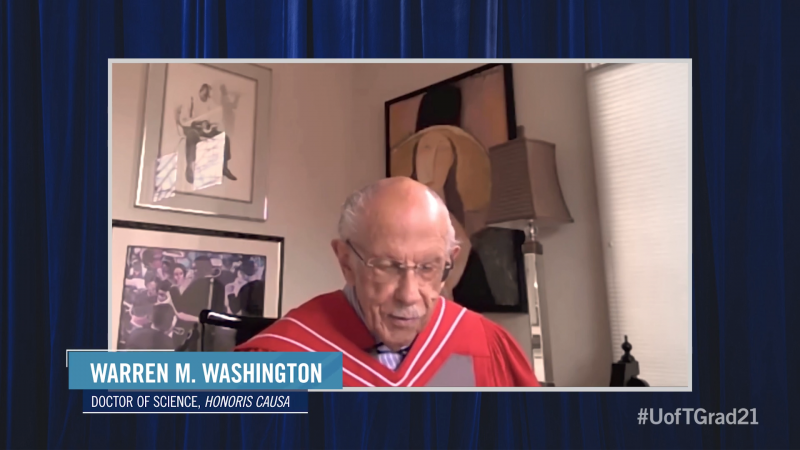June 21, 2021 | Volunteer & Awards
Pioneering climate change researcher Warren Washington receives honorary degree
By Scott Anderson

An atmospheric scientist for more than 50 years, Warren Washington (Hon DSc 2021) was among the first to harness the power of computers to track climate change. His complex models, which he continued to update and refine throughout his career, have been a vital tool for assessing humanity’s impact on the global environment.
For his excellence in the academy, as an internationally recognized pioneer of innovative climate change research and methodology, Washington today received a Doctor of Science, honoris causa, from the University of Toronto.
Scientists came from ordinary families and achieved their goals through persistence and hard work. I felt that I could get into science, too
Born in Portland, Ore. in 1936, Washington became interested in science in grade school, and started borrowing books about famous scientists from the local public library. He says in the introduction to his autobiography that reading about Thomas Edison, Albert Einstein and, in particular, George Washington Carver taught him that scientists came from ordinary families like his own and achieved their goals through persistence and hard work. “I felt that I could get into science, too,” he said.
While he was growing up, Black people made up a tiny fraction of Oregon’s population. Washington remembers people frequently calling him racial slurs, mostly from their cars. (His mother also told him, long after the fact, that there had been some “hostility” from nearby residents when his family had moved into a new neighbourhood.) During high school, he served as the vice-chair of the Junior National Association for the Advancement of Colored People – an experience that, he said, “helped give me confidence that I could contribute to making a change.”
Washington enrolled at Oregon State University and earned a bachelor’s degree in physics and a master’s degree in meteorology. A summer internship at Stanford Research Institute that involved using computers to create a model of the atmosphere fascinated him. He completed his PhD in meteorology at Pennsylvania State University in 1964 – becoming only the second Black scholar in the United States to earn a doctorate in the atmospheric sciences.
They just described the concept to their director over lunch. His response: 'Good idea, get started'
While finishing his dissertation, Washington had joined the National Center for Atmospheric Research in Boulder, Colo. He worked with a colleague, Akira Kasahara, to develop one of the first computer models of Earth’s climate, with the intention of eventually making the model available to other universities to use as a tool. As Washington recalled in an interview with Oregon State University, he and Kasahara didn’t write a proposal or fill out any paperwork about what they planned to do. They just described the concept to their director over lunch. His response: “Good idea, get started.”
As computers became more powerful, Washington collaborated with other researchers to update the climate model he and Kasahara had created, adding information about oceans, sea ice and rising levels of carbon dioxide. This pioneering work has enabled scientists to predict the impact of increasing carbon dioxide, and has been crucial to the periodic assessments by the Intergovernmental Panel on Climate Change (IPCC).
Echoing the warnings from that organization, Washington told the Class of 2021 today that without action to reduce climate change, we will see “rising sea levels and thawing permafrost, as well as increasing climate extremes.” He urged them to take personal responsibility. “Each of you graduates has an obligation to help preserve this planet for future generations.”
Each of you graduates has an obligation to help preserve this planet for future generations
An adviser to five U.S. presidents over his career, Washington has received numerous awards for his contributions to atmospheric science. He is a member of the U.S. National Academy of Engineering and a fellow of the American Philosophical Society and of the American Academy of Arts and Sciences. He has received three previous honorary doctorates and, in 2010, was one of 10 researchers to be awarded the National Medal of Science by U.S. President Barack Obama.
Throughout his career, Washington has mentored dozens of undergraduate and graduate students, particularly those underrepresented in the sciences. In 2000, he won the Charles E. Anderson Award from the American Meteorological Society for his “pioneering efforts as a mentor” and his “passionate support of individuals, educational programs, and outreach initiatives designed to foster a diverse population of atmospheric scientists.”
In 2018, Washington retired from the National Center for Atmospheric Research, where he retains the title of distinguished scholar. He continues to mentor students, give lectures and review reports for the National Academies of Sciences, Engineering, and Medicine.

